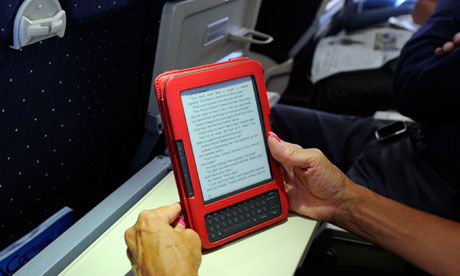 我最近经常旅行,每次我坐飞机的时候我都要跟飞机上的乘务人员进行下面类似的对话。
我最近经常旅行,每次我坐飞机的时候我都要跟飞机上的乘务人员进行下面类似的对话。
“飞机要降落,请您关闭您的Kindle”
"你可以不关闭Kindle,你只需滑动到墙纸模式,这种模式下你也能看到文字。我已经把3G关掉了。"
“那么就请调到墙纸模式吧。”
“...无论我坐在这里看着屏幕上的字,还是墙纸模式下的图片文字,这两种情况下可能造成的潜在的干扰都是一样的——几乎就是没有。”
“我想这估计不管用吧。还是请关闭吧。”
我被激怒了,但是你必须这么做,因为乘务人员已经通知你这样做了。事实上,我曾经发现你可以关掉Kindle(按住开关键几秒钟,而不是仅仅滑动一下好像你滑动到了墙纸模式一样),但是我依旧很愤怒:因为电子阅读器工作的特点在于,当它无论显示的是文字或者是墙纸是,都不浪费一点电量,所以,电子阅读器比起你邻座阅读的纸质版的书籍来讲,对飞机一样没有任何的威胁。
但是随着越来越多的人上飞机时携带电子产品——航空公司称之为个人电子设备(PEDs)——这些设备对于飞机的飞行系统造成的干扰有多高的危险?这个问题的回答很复杂。
大卫•卡森(Dave Carson),波音飞机的一位工程师,曾经主持美国联邦咨询委员会,这一组织主要来研究飞机上个人电子设备的安全性问题。大卫说道,电子设备可能在两点上会干扰你的飞行“有目的性辐射”和“非目的性辐射”两种。像手机或者其他带有Wi-Fi的产品是前者,就是说“他们产品自身就会传输无线电频率电磁辐射”,卡森说道。他也指出手机如果在飞行中没有关机的话会造成手机与最近的钟塔距离加大,因此会造成手机高负荷运转。其他诸如CD播放器以及电子阅读器的设备传出的是“非目的性的辐射”,卡森说道。这些辐射是在电子设备中转换电路引起的。
设备造成的辐射会通过窗户、门、舱门等渗漏出去,并且可能分解了在飞机机身上的天线获取的信号。尽管飞机内部的系统会屏蔽,但是如果把你的笔记本电脑放在飞机舱内,也会干扰到“敏感电路”。卡森说道。
英国民航总局(CAA)指出,跟手机有关的事故有一大把,尽管有人指出问题恰好发生在有旅客使用手机的时候,但这并不能作为手机造成事故的证据。2000年3月一本飞机杂志上,波音承认不能够发现个人电子设备与飞机系统非正常运转之间存在关联。那就取消规定吧?但是答案是否定的。
卡森说道:“像电子笔记本电脑以及手机,对飞机的造成的危险时很小的,但同时,飞机上依旧不允许使用,或者某些时候是起飞和降落的时候不允许使用。”
那么Kindles呢?理查德•泰勒(Richard Taylor),来自英国民航总局,他承认,“Kindle的危险比起手机要对安全造成的风险小得多。”卡罗琳•伊万(Carolyn Evans),来自英国航空宇航员协会(Balpa),承认“不带3G网络连接的电子阅读器不会有什么麻烦”,但是他补充道,“但对于乘务人员来说没办法确认哪个开了3G哪个没开”。
这就是个合理的议题——如果你不幸赶上了一次危险的迫降,只有这些乘务员你才可以指望的上。他们希望你在紧急情况时注意,不要在电脑上看电影。
在接受采访时,英国民航总局与英国宇航员协会双双为关闭电子设备引用了另外一个原因:这些设备在紧急情况发生时可能会在飞机舱内滑落,这是非常致命的危险。你不想被一个本应收起来的笔记本电脑砸中头部。但是,电子阅读器似乎不存在这个问题。我阅读了一本书,书也只能掉在地上。最新出版的风靡书籍肯定要比Kindle要沉吧。
在最后的分析中,你的Kindle很有可能不会对飞机造成影响。但是问题在于——尽管理由充分——但是规则是统一的:每个电子设备必须要关闭。
这种局面会发生改变吗?来自纽约时报的记者尼克•比尔顿(Nick Bilton)在美国开展了同样的研究,他从美国联邦飞行管理局摘录了一段承诺,这可能会将是一个 “新鲜的看法”。比尔顿说迄今为止还没有任何的改变;但是,随着飞机构造的改变,也许更多的美国人能够允许电子设备登机。
回到英国,英国民航总局说道 :“我们在保证合理以及适应潜在风险的前提下保持我们的规定变。随着技术的发展,我们承诺会保证我们的规定随之调整,同时保证飞行安全。”
所以也许有一天你可以一直在飞机落地开启舱门时都可以一直阅读你的Kindle。不过那时候,你可能就会变得富裕,随身携带的就是纸质老式的书籍了。
I have done a bit of travelling recently, and each time I've flown, I have had a conversation with the cabin crew that goes something like this.
"Turn off your Kindle, please, for landing."
"You can't turn off a Kindle. You flip it to wallpaper mode, which is the same as displaying a page with words on it. I've already turned off the 3G."
"Turn it to wallpaper mode, then, please."
"... and whether I'm sitting here looking at words on the screen or the wallpaper display, it doesn't make any difference to the amount of potential interference it could cause – which is pretty much none."
"I'm afraid that doesn't matter. Turn it off, please."
Infuriating, but you have to do as you're told by cabin crew. In fact I have since discovered that you can turn a Kindle off (by holding the switch for a few seconds rather than simply sliding it and letting it go as if you were flipping it to wallpaper), but the irritation remains: because of the way e-ink devices work, they draw no power when displaying either the words on the page or the wallpaper, and so should pose no more of a threat to an aircraft than the hardback the person in the next seat is reading.
But as more of us are flying with more and more electronic gadgets – what the airlines call Personal Electronic Devices (PEDs) – how high is the risk of them interfering with the aircraft's avionics systems? The answer is a complicated one.
Dave Carson, an engineer with Boeing who co-chaired a US Federal Advisory Committee that looked at the safe use of PEDs on aircraft, says there are two ways in which devices could mess with your flight: "intentional emissions" and "non-intentional emissions". Devices such as mobile phones or those with Wi-Fi are sources of the former, meaning "they intentionally transmit radio frequency electromagnetic radiation", says Carson. He also points out that mobiles left switched on during flight may be a great distance from the nearest cell tower and consequently try to operate at higher power levels. Other devices such as CD players and e-ink readers pump out "non-intentional emissions", says Carson. Those emissions are caused by the switching circuitry in the electronics.
Emissions from devices leak out of the aircraft via windows, doors and hatches and could degrade the signals picked up by the antennas mounted on the aircraft's fuselage. And although an aircraft's internal systems are shielded, using your laptop right next to the wall of the plane could also interfere with "sensitive circuits", says Carson.
The UK Civil Aviation Authority (CAA) points to a handful of incidents where a mobile phone has been "involved", although noting that problems had occurred at the same time a passenger happened to be using a mobile device doesn't exactly represent proof. And in a piece for Aero magazine in March 2000, Boeing admitted it could not find "a definite correlation" between PEDs and aircraft systems malfunctions. Case closed, then? Well, no.
Says Carson: "There is a very small risk from devices such as laptops and mobiles, and while that remains, their use isn't going to be allowed in flight, or at any rate, during take-off and landing."
But what about Kindles? Richard Taylor of the CAA acknowledges that they "represent a much-reduced safety risk compared with mobiles". Carolyn Evans of the British Airline Pilots Association (Balpa) admits that "an e-ink reader with 3G connectivity disabled would not cause a problem", but adds that "it is too difficult for the cabin staff to confirm who has got their 3G on, and who hasn't".
That's a reasonable argument – it's the cabin crew on whose help you might rely if you're unfortunate enough to be heading for a dangerous landing. They want you paying attention to them in the event of an emergency, not watching a video on your tablet.
When pressed, both the CAA and Balpa cited another reason for switching off bits of electronic kit: they're potentially deadly if they're flying through the cabin in an emergency. You don't want to be hit in the head by a laptop that should have been put away. Again, the logic is hard to follow where e-readers are concerned. I have read a book all the way down to the ground; and the latest hardback bonkbuster is certainly heavier than a Kindle.
In the final analysis, your Kindle is extremely unlikely to bring an aircraft down. What matters is – reasonably enough – that the regulations are uniform: everything electronic must be turned off.
Is this going to change? The New York Times journalist Nick Bilton has carried out research in the US on the same issue, and extracted a pledge in March from the Federal Aviation Administration that it would take "a fresh look". Bilton says that there's been no change so far; however, the tectonic plates may be shifting as more and more Americans bearing gadgets board planes .
Back in the UK, the CAA says: "We keep our regulation under review to ensure it remains appropriate and proportionate to potential safety risk. As technology develops, we are committed to ensuring our regulation keeps pace while continuing to maintain flight safety."
So maybe the day will come when you can continue reading on your Kindle until you arrive at the gate. Until then, though, you might be better off with an old-fashioned paperback.
 我最近经常旅行,每次我坐飞机的时候我都要跟飞机上的乘务人员进行下面类似的对话。
我最近经常旅行,每次我坐飞机的时候我都要跟飞机上的乘务人员进行下面类似的对话。
